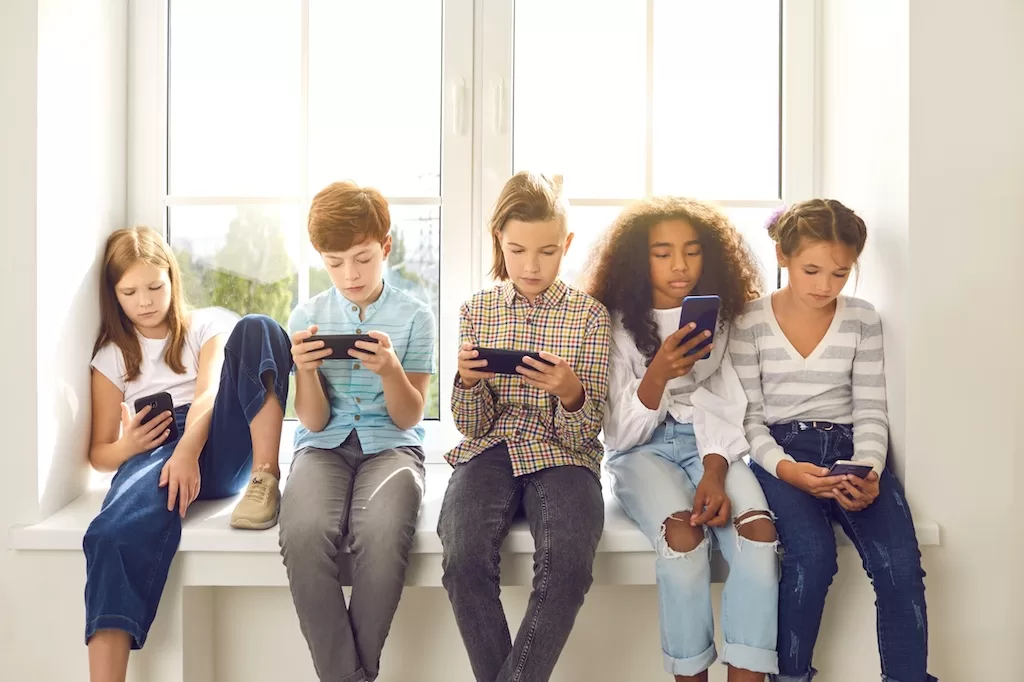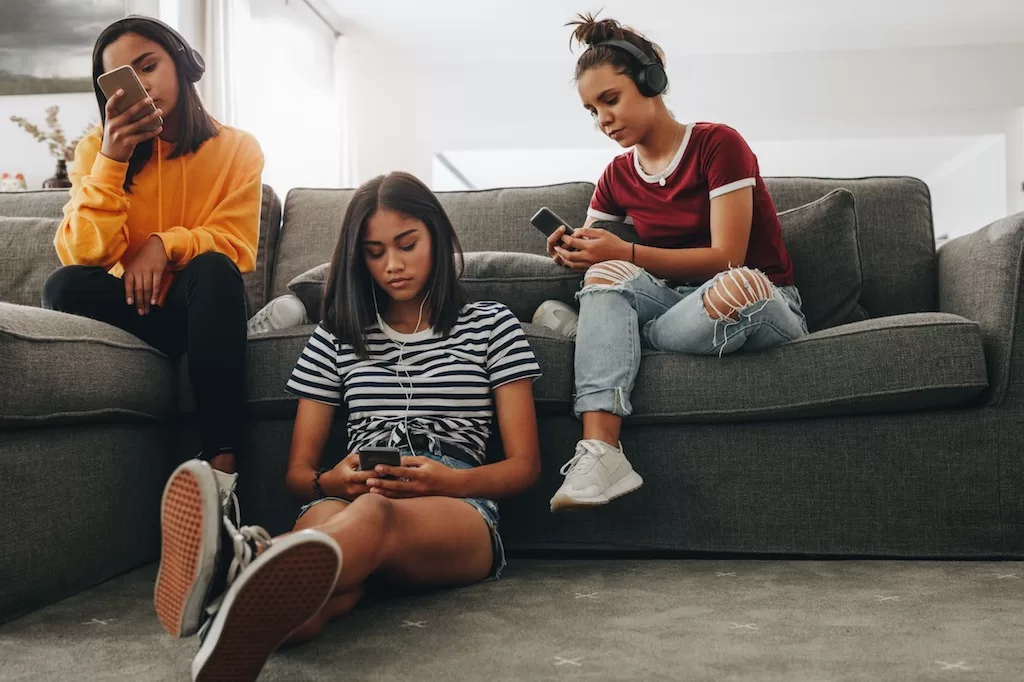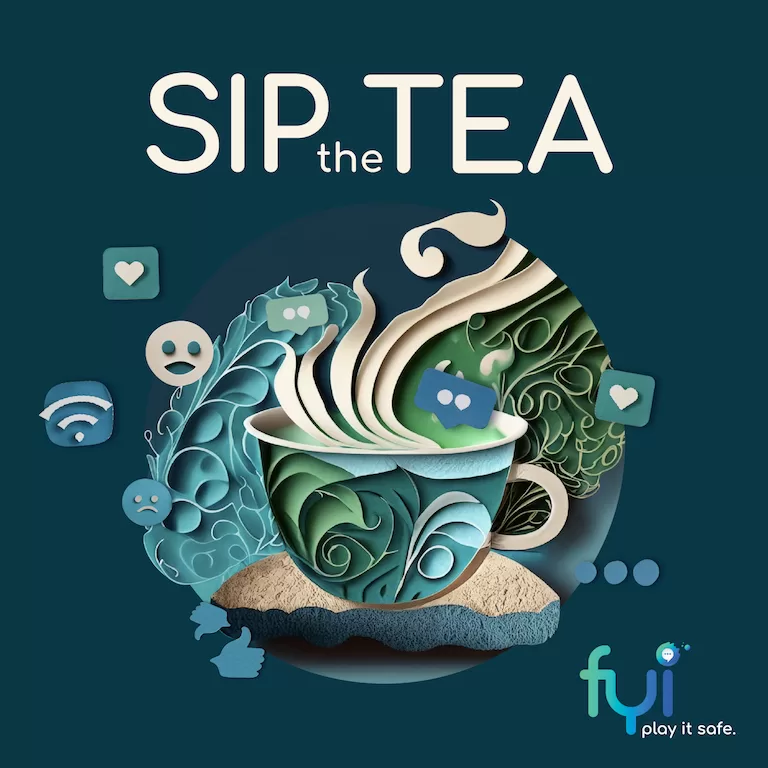Always online – SA teens share real-life experiences
- FYI play it safe launches ‘Sip the Tea’ podcast –
October 2023
If you’re the parent of a teenager, you most likely don’t know as much about their online life as you should. Our children are immersed in the digital world, inhabiting digital environments, and gathering in digital spaces that most parents don’t even know exist, never mind understand how to navigate. It doesn’t help that these virtual locales where teens meet up and hang out are ever-changing; they can disappear in a whiff, migrate at a whim and new ones pop up every day. It’s nearly impossible for parents to keep up.

Our tweens and teens range across a multitude of social media, gaming environments and messaging platforms where they find the connection and validation that is so vital to their life-stages. But they also encounter risks and dangers. ‘Sipping the tea’ is teen slang for side-eyeing the juicy ‘gos’ and listening in to get the latest scoop.
Rachelle Best, parent of a teenage daughter and the CEO and Founder of the AI-powered monitoring app, FYI play it safe, is the host of Sip the Tea. Across the first season of eight episodes launching on 17th October, Rachelle, in conversation with presenter, Amy Maclver, tackles major themes impacting on teens’ online lives, such as cyberbullying, online grooming, pornography and exposure to upsetting content. Teens’ voices, digitally altered to protect identity, are prominent throughout the series, as they open up to Rachelle about their own experiences as well as share insights about the experiences of their siblings and friends.

Rachelle says, “Parents listening in may be surprised at the frankness and honesty. Teens so often have the reputation for reticence or even being secretive when it comes to connecting with adults. “In my journey, both through Sip the Tea interviews and engaging with children in schools, one glaring truth has emerged — our kids crave open and honest conversations about the digital world’s lurking risks and threats. They are not just curious; they’re deeply disturbed by the dangers they face online. Remarkably, many of these young people don’t merely seek protection; they aspire to help us, the adults, understand the real risks they face. Most agree that there should be limits and protections on children’s online activity – in fact, they recommend these. What they don’t want though, is to be judged and punished for their curiosity or their mistakes. They don’t want the adults to overreact. They don’t want the WIFI switched off or to have their devices taken away. Instead, they’re offering us a unique opportunity — a chance for parents to reshape their approach to online safety. It’s an invitation to build an understanding relationship with their teen based on open and honest communication.”

On the one hand, there are parents who are prone to overreact and rigidly police their children’s devices, and on the other are those who have their heads in the sand and believe the risks will never materialise with their children. Rachelle says, “Unfortunately, the ‘not my child syndrome’ is rife in South Africa. There are parents who do nothing or so little to create a family online safety ecosystem, and then blithely say they don’t need to because they ‘trust their child’. However, online safety should not be linked to the trust-relationship with your child. Harmful content is everywhere, and your child does not necessarily have to go looking for it to be exposed. A child may see porn through no fault of their own, think that the trust-relationship with their parents is now ruined and that their parents won’t trust them again. When I conducted the Sip the Tea interviews, I anticipated some shocking stories about online grooming, cyber bullying and pornography; what I didn’t expect is the extreme cruelty that some of the children had encountered. We hear from these kids’ stories, that they have been exposed to some of the most horrific scenes imaginable, which is bound to make a lasting impact on their emotional well-being.”
The family online safety ecosystem that Rachelle refers to here is the use of multiple solutions that goes beyond just deploying the phone’s screen time limit and parental controls to restrict access to some known websites and apps. While these play a role in the online safety ecosystem, their efficacy is partial. Latest solutions such as FYI play it safe draw on AI and ML to monitor the content of children’s online activity across multiple devices in real-time. This provides parents with proactive alerts when their children may be exposed to online risks. It dynamically monitors all the content that the child engages with, including social media, in-game and instant messaging chats.
Apart from opening parents’ eyes to online risks, Sip the Tea offers a balanced view of the lives of our digital natives. Rachelle says, “There are so many benefits to teens being online. It’s wonderful to hear how they make lasting friendships and find acceptance and reassurance in the digital world. There’s so much to learn, so many opportunities to find and develop your passions and so many ways to grow as a responsible digital citizen. What’s important for parents is to become empowered and knowledgeable. We need to understand teen digital spaces better, we need to be clear about risks and threats, and we need to be proactive when it comes to helping our teens stay safer online.”
You can find Sip the Tea on all major podcasting platforms, including Apple Podcasts, Spotify, Google Podcasts, and more, from 17th October 2023.
Episode 1: Teens and tech – We explore the technology setups that tweens and teens have at home. We delve into the rules, controls, and guidance in place to ensure safe and balanced digital engagement.
Episode 2: Social media and the apps they use – We lift the curtain on the online social worlds of today’s youth. From Snapchat and TikTok to Discord, we explore the apps they’re using and the experiences they’re having on these platforms.
Episode 3: Stranger danger and online grooming – We share the real stories of online encounters and the dangers lurking in the digital shadows.
Episode 4: Pornography exposure – We take a candid look at the exposure tweens and teens have to pornography online. This challenging episode provides critical insights into their early encounters.
Episode 5: Pornography addiction – In this episode, we hear open stories of teenagers admitting to being addicted to pornography. We also talk to a psychologist about the impact of pornography addiction on the mental and emotional well-being of young people.
Episode 6: Gaming – An exploration of the world of gaming, its allure, and the challenges it presents.
Episode 7: Cyber bullying – Real stories of online harassment and bullying. We shed light on talking to your child about cyber bullying.
Episode 8: Violence, gore and upsetting content – A deep dive into the darker side of being online. We hear some shocking encounters of what tweens and teens are really exposed to and how they stumble across the content.
For more information visit www.fyiplayitsafe.com





























